If you’re looking for a furry friend to add to your family, look no further than the Corgi. These adorable dogs have a cute and cuddly appearance, as well as a charming personality to match. However, finding a purebred and healthy Corgi can be a challenging task due to the numerous dog businesses operating today, which can be overwhelming for potential owners. The following article aims to provide you with essential information about Corgis to help you decide if this is the right breed for you.
1. All About Corgis
Origin of the Corgi
The full name of this breed is the Pembroke Welsh Corgi, which translates from Welsh as “dwarf dog” (“cor” meaning dwarf and “gi” meaning dog). This name aptly describes the physical characteristics of the Corgi: short, round, and incredibly cute. According to legend, Corgis were gifted to humans by forest fairies, who are said to have enchanted their fur.
Researchers believe that the Corgi breed has existed for approximately 3,000 years, with the first recorded appearance of the dog in Wales. It is thought that the Corgi may have descended from the Vallhund, a Swedish dog breed from the pre-Viking era.
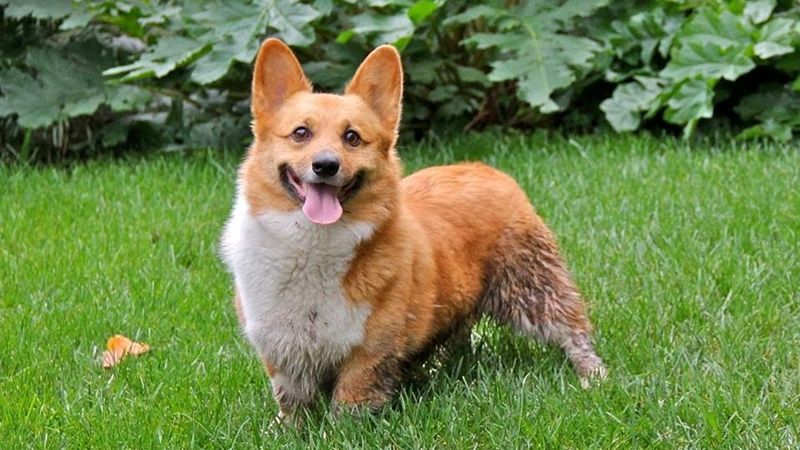 Origin of the Corgi
Origin of the Corgi
Upon closer inspection, you’ll notice that Corgis share some physical traits with other dog breeds, such as the Alaskan Malamute, the Samoyed, and several Northern European dog breeds.
Interestingly, despite their small stature, Corgis were historically used for herding livestock. This may seem illogical, but it is actually a brilliant choice. The short legs of the Corgi are an advantage when herding, as they are less likely to be kicked by larger animals. If a livestock animal strayed from the herd, the Corgi would quickly nip at its heels to guide it back.
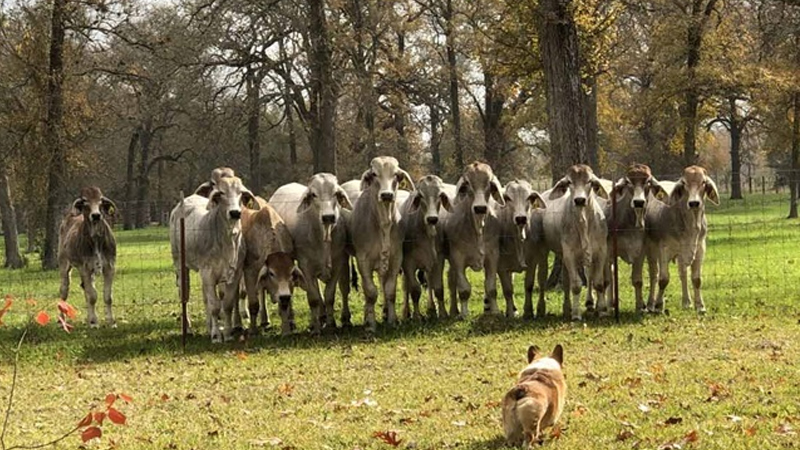
As herding became less common in Europe, Corgis were increasingly adopted as companion animals, thanks to their intelligence and adorable appearance.
Corgis were introduced to Vietnam around 2010 and quickly gained popularity among pet enthusiasts and dog lovers, creating a real “fever” for this charming breed.
Corgi Classification
Pembroke Corgi
The Pembroke Corgi originates from a breed with a very short tail, and most Pembrokes are born without a tail. If they are born with a tail, it is usually docked when they are 2-5 days old.
Pembrokes typically stand at a height of 25-30 cm and weigh around 13 kg. This breed has a long body, a short tail, and pointed, erect ears. Their body shape is similar to that of larger breeds, but with shorter legs. It is important to control their diet and provide regular exercise to maintain their health.
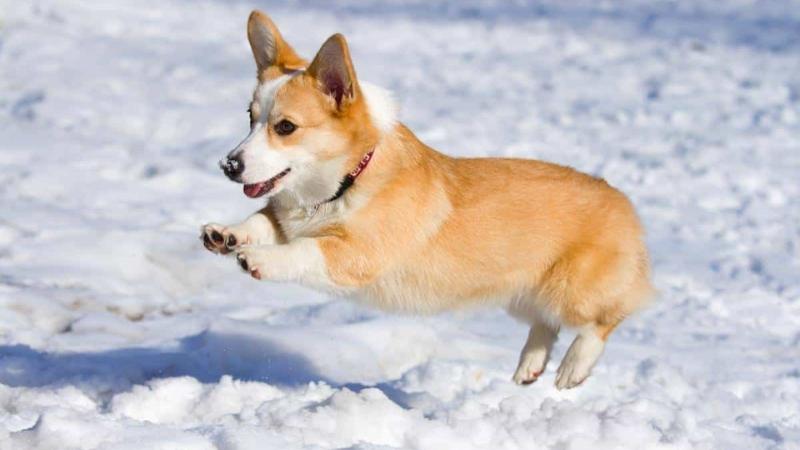 Pembroke Corgi
Pembroke Corgi
Cardigan Welsh Corgi
The Cardigan Welsh Corgi is a breed with a modest height, a long body, large erect ears, and a tail that curls downward, distinguishing it from the tailless Pembroke. This breed tends to look heavier than the Pembroke, with larger ears and rounder legs.
Their coats can vary in color, including brown, blue merle, light brown, black, and brindle, among others. Cardigan Welsh Corgis are highly intelligent, obedient, and protective of their owners. They are also calm, loyal, and affectionate, but they remain cautious around strangers.
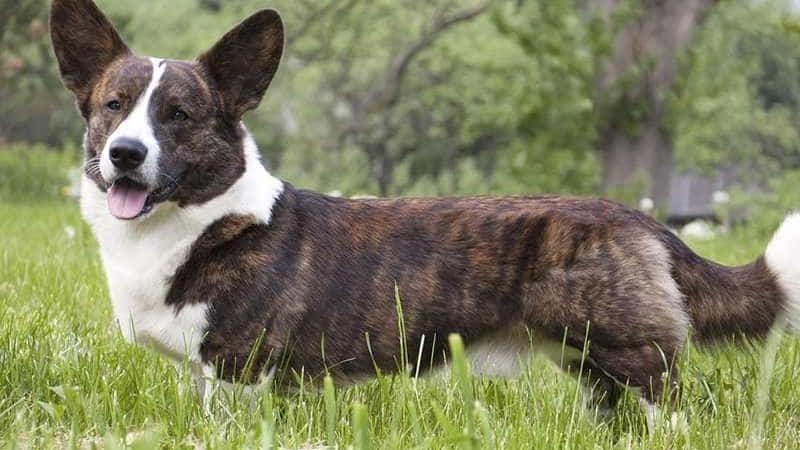 Cardigan Welsh Corgi
Cardigan Welsh Corgi
Common Corgi Coat Colors
Corgis come in a variety of beautiful coat colors, including five basic shades: red, black, blue merle, sable, and brindle. The four recognized colors for the Pembroke Welsh Corgi are red, red with white markings, black with white markings, and sable. The Cardigan Welsh Corgi displays a wider range of colors, including merle, brindle, black, red, and sable.
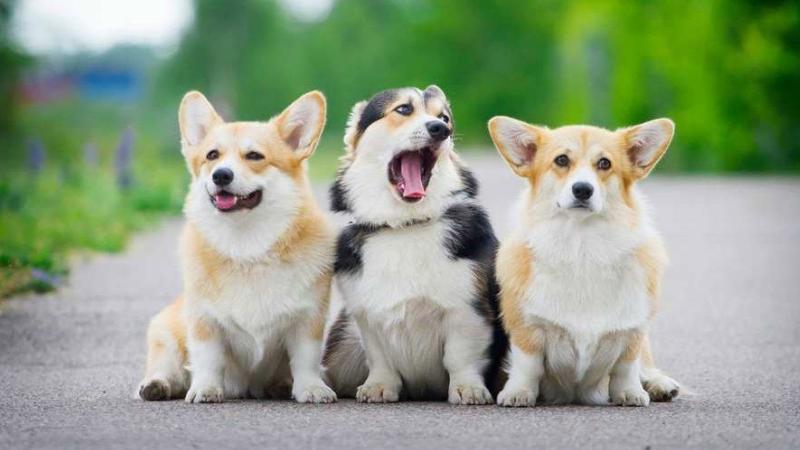 Common Corgi Coat Colors
Common Corgi Coat Colors
Physical Characteristics of the Corgi
The short-legged Corgi has triangular, erect ears that are well-proportioned with their face. They have a long, pointed nose, round eyes, and a small mouth and chin, giving them a sharp appearance. Corgis are often referred to as “fox dogs” due to their resemblance to foxes.
Personality Traits
Corgis are incredibly intelligent, ranking among the 11 smartest dog breeds in the world. While they are smart, they can also be stubborn at times and may intentionally disobey your commands.
Corgis are loyal companions and very friendly, especially with children. However, they are active and rarely sit still, so it’s best to keep them away from very young children. Regular outdoor playtime, running, and jumping are essential to release their energy and keep them happy.
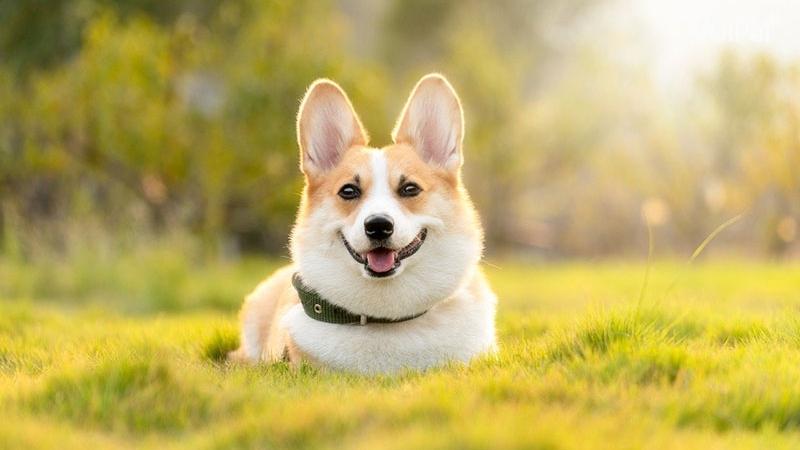 Personality Traits of the Corgi
Personality Traits of the Corgi
Reasons to Own a Corgi
Corgis are incredibly affectionate and loyal to their owners. If you’re seeking a canine companion, the Corgi is an excellent choice. They are also very friendly towards others and are great with children, as they love to play and show care for them.
Corgis are known for their adorable expressions and antics, ensuring that your home is filled with laughter and joy.
 Reasons to Own a Corgi
Reasons to Own a Corgi
Further Reading:
2. How to Care for a Corgi
Corgi Diet
Protein and Fat Sources: Meat, fish, and eggs are excellent sources of protein and fat for your Corgi, but be mindful that Corgis are prone to obesity, so avoid overfeeding fatty foods. Meat alone should provide sufficient fat in their diet.
Fiber-Rich Foods: Include vegetables and fruits such as carrots, sweet potatoes, and apples to provide essential fiber.
Starchy Foods: Incorporate starchy foods like rice, potatoes, and even bread or pasta in moderation.
Vitamin and Mineral Supplements: Offer foods like liver, fish, and dairy products to ensure your Corgi receives a full spectrum of vitamins and minerals. Additionally, consider adding seaweed to their diet to provide essential nutrients.

Corgis love to play and run in open spaces, so ensure they have access to a spacious yard, a park, or the opportunity to go on walks. This not only benefits their physical health but also contributes to their overall happiness and well-being.
Common Health Issues in Corgis
- Obesity: This is a common issue in short-legged dog breeds. Regular exercise is crucial to prevent obesity, and it’s important not to overfeed your Corgi. Establish a healthy diet and exercise routine for your furry friend.
- Hair Loss: Corgis are prone to hair loss due to their thick coats. This can be exacerbated by high external temperatures, as well as parasites, mold, and food allergies.
- Heat Stroke: Corgis, being adapted to colder climates, may struggle with the hot and humid weather in Vietnam. They can experience dizziness, vomiting, nosebleeds, and even loss of consciousness in extreme cases.
- Joint Problems: The short legs of the Corgi bear the weight of their round bodies, which can lead to joint pain and bone issues over time.

Important Considerations When Caring for a Corgi
In addition to providing a suitable living environment, it is crucial to offer a well-balanced diet to ensure the holistic development of your Corgi. Just like any other living being, Corgis require a variety of essential nutrients, including fiber, fats, vitamins, protein, and minerals.
Corgis can consume both mashed and finely chopped food. Observe their eating habits and adjust the texture and portion size accordingly.
Due to their propensity for obesity, regular exercise is a must for Corgis. Aim to take them outdoors daily, allowing them to run, play, and explore to stay active and content.
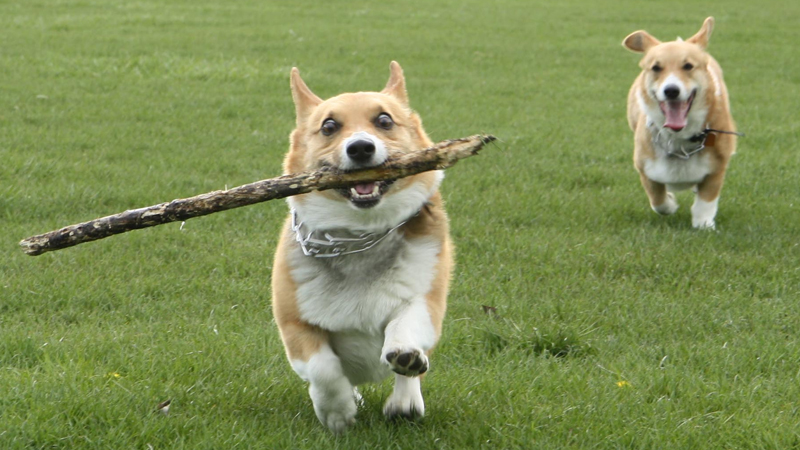
Given their herding instincts, Corgis may chase after motorcycles, bicycles, cars, or other dogs during walks. Always be prepared and have a leash handy when taking them out!
It is also essential to ensure your Corgi receives proper and timely vaccinations. Vaccinations protect your furry friend from dangerous diseases, and in the event of an infection, they increase the chances of a full recovery.
3. Tips for Buying a Corgi
Corgi Price Range
The price of a Corgi depends on its origin. Currently, there are two main sources of Corgis in the market: those bred domestically and those imported from other countries.
Corgis born and bred in Vietnam, with purebred parents and proper documentation, typically cost between 8-10 million VND. These Corgis are well-adapted to the local climate and are a popular choice among pet owners.
Corgis born in Vietnam but with VKA certification (a document that traces the lineage of purebred dogs) issued by the Vietnam Kennel Association are more expensive, ranging from 12-14 million VND. The price may vary depending on the dog’s pedigree. Obtaining VKA certification is a lengthy and rigorous process.
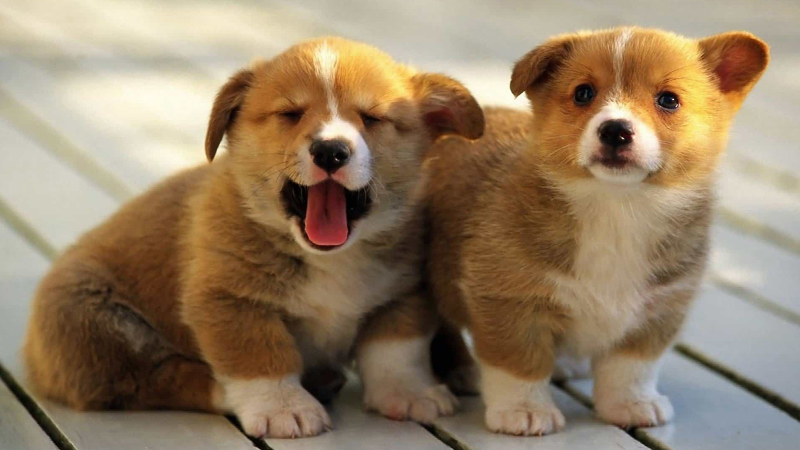
Imported Corgis from Thailand, with FCI certification (similar to VKA), are priced between 25-30 million VND. The most expensive Corgis are those imported from Europe, costing upwards of $2,000-$2,500, including shipping fees.
Things to Consider When Buying a Corgi
When purchasing a Corgi, it is essential to choose a reputable breeder who prioritizes the health and well-being of their dogs. Pay attention to factors such as the dog’s origin, purity, coat color, genetics, documentation, and vaccination history.
If you’re fortunate enough to welcome a Corgi into your life, be sure to provide a loving and safe environment, along with a nutritious diet and ample opportunities for exercise and play. We wish you and your furry friend a lifetime of happiness together!
Join us as we explore the world of the charming short-legged Corgi. This beloved breed has captured the hearts of people worldwide and continues to be cherished and adored.
You May Also Like:
The Ultimate Guide to Bathing and Grooming Your Corgi
Frequent bathing for your Corgi is not just about keeping them smelling fresh and clean, but it’s also an important step in maintaining their overall health and hygiene by eliminating disease-causing fleas and ticks. Discover the art of bathing and grooming your beloved Corgi, ensuring they not only look their best but also stay happy and healthy.


































